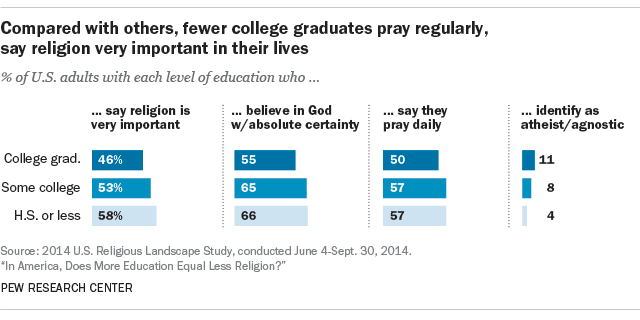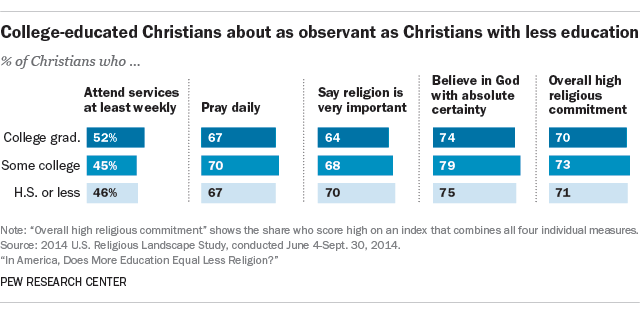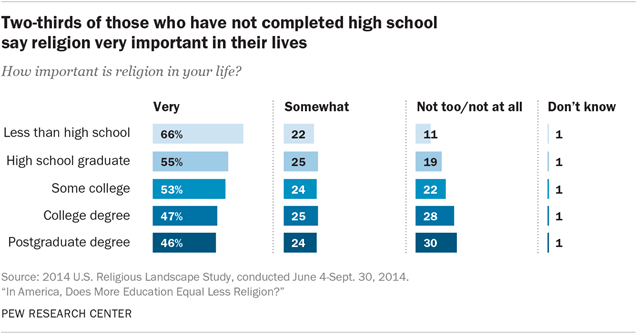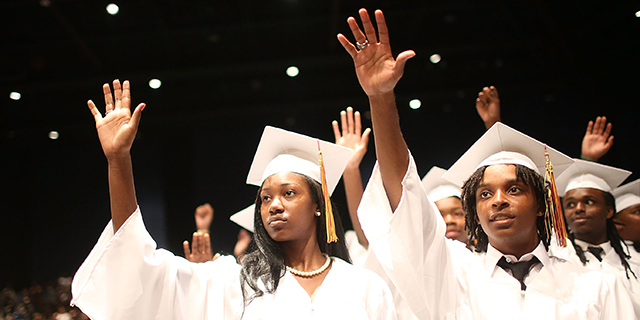
The idea that highly educated people are less religious, on average, than those with less education has been a part of the public discourse for decades, but some scholars of religion have called this notion into question. 1 And a new analysis of Pew Research Center surveys shows that the relationship between religion and education in the United States is not so simple.
On one hand, among U.S. adults overall, higher levels of education are linked with lower levels of religious commitment by some measures, such as belief in God, how often people pray and how important they say religion is to them. On the other hand, Americans with college degrees report attending religious services as often as Americans with less education.
Other Pew Research Center data on religion and education
Moreover, the majority of American adults (71%) identify as Christians. And among Christians, those with higher levels of education appear to be just as religious as those with less schooling, on average. In fact, highly educated Christians are more likely than less-educated Christians to say they are weekly churchgoers. 2
Looking at the U.S. public as a whole, however, the answer to the question of whether more education is correlated with less religion appears to be yes. Among all U.S. adults, college graduates are considerably less likely than those who have less education to say religion is “very important” in their lives: Fewer than half of college graduates (46%) say this, compared with nearly six-in-ten of those with no more than a high school education (58%).
Highly educated Americans also are less inclined than others to say they believe in God with absolute certainty and to pray on a daily basis. And, when asked about their religious identity, college graduates are more likely than others to describe themselves as atheists or agnostics (11% of college grads vs. 4% of U.S. adults with a high school education or less).
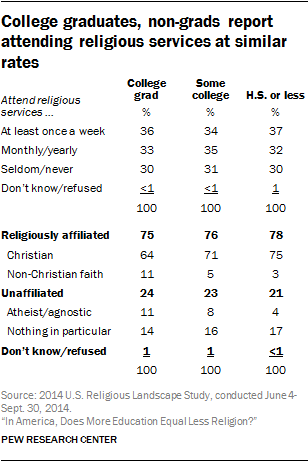 At the same time, Americans with college degrees are no less likely than others to report attending religious services on a weekly basis. Roughly a third of U.S. adults with college degrees (36%) say they attend a house of worship at least weekly, about the same as the share of those with some college (34%) and those with a high school diploma or less education (37%) who say they attend services once a week or more.
At the same time, Americans with college degrees are no less likely than others to report attending religious services on a weekly basis. Roughly a third of U.S. adults with college degrees (36%) say they attend a house of worship at least weekly, about the same as the share of those with some college (34%) and those with a high school diploma or less education (37%) who say they attend services once a week or more.
And while college graduates are more likely than others to describe themselves as atheists or agnostics and less likely to identify with Christianity (64% describe themselves as Christians, compared with 71% of those with some college education and 75% of those with a high school degree or less), they are not, on the whole, much less likely than others to identify with any religion. Indeed, fully three-quarters of college graduates are affiliated with some religion (including 11% who say they are adherents of non-Christian faiths like Judaism, Hinduism, Islam and Buddhism), as are 76% of those with some college experience and 78% of those whose education topped out with high school.
In addition, among those who do identify as Christians, college graduates tend to be about as religiously observant as those with less education – and in some cases more so. For instance, more than half of college-educated Christians say they attend religious services on a weekly basis (52%), compared with 45% of Christians with some college experience and 46% of Christians with a high school degree or less.
Overall, 70% of Christians with college degrees have a high level of religious commitment on a scale incorporating four common measures of religious observance (worship attendance, frequency of prayer, belief in God and the self-described importance of religion in one’s life), as do 73% of those with some college and 71% of those with no college experience. 3
There could be many possible reasons for these patterns, though such explanations are outside the scope of this report. This analysis does not attempt to explain why, for example, Americans with more education are less likely to express belief in God. Nor does it try to explain why college-educated Christians appear to go to church more often than less-educated Christians. The focus here is simply on describing the patterns found in recent Pew Research Center polling, particularly the very large U.S. Religious Landscape Study, which involved interviews with more than 35,000 Americans reached on randomly dialed cellphones and landlines.
For ease of presentation, this analysis generally uses three categories of educational attainment, dividing U.S. adults into those who have a college degree, those who have some college (including those with an associate’s degree and those with some community college experience), and those who have only a high school diploma or less (including those with no high school diploma and those who never reached high school).
The broad patterns are largely the same if the number of educational categories is expanded, for example, by separating Americans who hold postgraduate degrees from those with just bachelor’s degrees, or by separating those who have not completed high school from those who have a high school diploma but no college experience. In fact, those at the lowest end of the educational spectrum (i.e., people who did not finish high school) stand out for especially high levels of religious observance by some measures, such as the self-described importance of religion in their lives, further supporting the idea that more education is connected with lower levels of religiosity among the U.S. public overall. (For more detail, see the detailed tables at the end of this report.)
Furthermore, the links between education and religion reported here generally persist in more sophisticated modeling even when other factors that might influence religious belief and practice – such as gender, race, age and religious tradition – are taken into account.
Religion and education within Christian traditions: Highly educated are generally at least as observant as those with less education
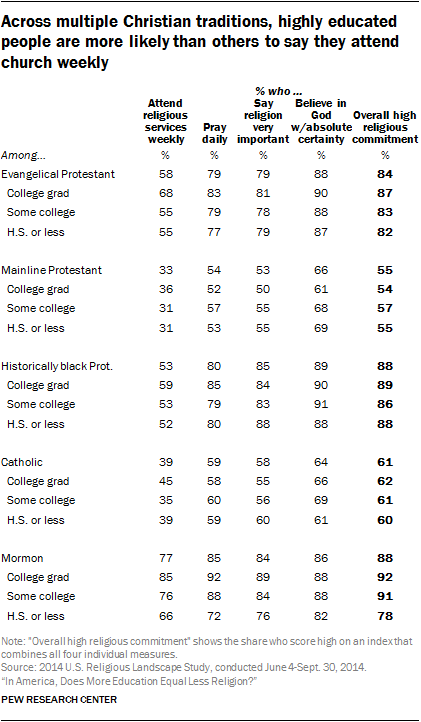 The tendency for Christian college graduates to exhibit rates of religious observance that are at least on par with their less highly educated counterparts is evident across a variety of Christian traditions. Among evangelical Protestants, for instance, 87% of college graduates are highly religious, according to the four-item index of religious commitment, as are 83% of those with some college and 82% of evangelicals with a high school diploma or less schooling.
The tendency for Christian college graduates to exhibit rates of religious observance that are at least on par with their less highly educated counterparts is evident across a variety of Christian traditions. Among evangelical Protestants, for instance, 87% of college graduates are highly religious, according to the four-item index of religious commitment, as are 83% of those with some college and 82% of evangelicals with a high school diploma or less schooling.
Catholics are, on the whole, less religiously observant than evangelicals. But here again, college-educated Catholics exhibit a similar overall level of religiosity (62% highly religious) as Catholics with less education (61% among those with some college, 60% among Catholics with only a high school education).
Among Mormons, those who are more highly educated are not simply as religious as those with less education – Mormons with college experience are more religiously observant, on average, than Mormons with less education. Fully 92% of college-educated Mormons are highly religious, as are 91% of Mormons with some college. Among Mormons whose education topped out with high school, however, just 78% score high on the index of religious observance.
The propensity for highly educated Christians to exhibit relatively high levels of religious observance is most pronounced with respect to religious attendance. Indeed, across all five of the nation’s largest Christian traditions, college graduates are significantly more likely than their counterparts with less education to say they attend religious services regularly. Among mainline Protestants, for instance, 36% of college graduates say they attend religious services on a weekly basis, compared with 31% of mainline Protestants who have not completed college. And among those in the historically black Protestant tradition, 59% of college graduates say they attend church weekly, compared with 53% of those with some college and 52% of those with only a high school education.4
On other measures of religious observance, college-educated Christians tend to look quite similar to those who haven’t completed college. There are, however, a few exceptions. Among mainline Protestants and Catholics, for instance, those with higher levels of education are slightly less likely to say religion is very important in their lives. And college-educated mainline Protestants are less likely than mainline Protestants who have less formal education to say they believe in God with absolute certainty.
Religion and education among religious ‘nones’ and Jews: Most highly educated are least religious
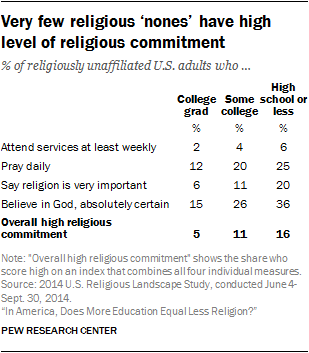 While college-educated Christians are about as observant – and sometimes more observant –than Christians with less education, the data show that among the religiously unaffiliated (i.e., those who describe their religious identity as atheist, agnostic or “nothing in particular”), those who have college degrees are considerably less religious than “nones” without a college education.
While college-educated Christians are about as observant – and sometimes more observant –than Christians with less education, the data show that among the religiously unaffiliated (i.e., those who describe their religious identity as atheist, agnostic or “nothing in particular”), those who have college degrees are considerably less religious than “nones” without a college education.
For example, just over a third of religious “nones” who have a high school diploma or less schooling say they believe in God with absolute certainty (36%), compared with just 15% of religiously unaffiliated adults who have completed college. One-quarter of “nones” whose education topped out with high school say they pray every day, which is double the share of college-educated “nones” who say they pray daily (12%). And while 20% of religiously unaffiliated adults with no college experience say religion is very important in their lives, only 6% of college-educated “nones” say the same.
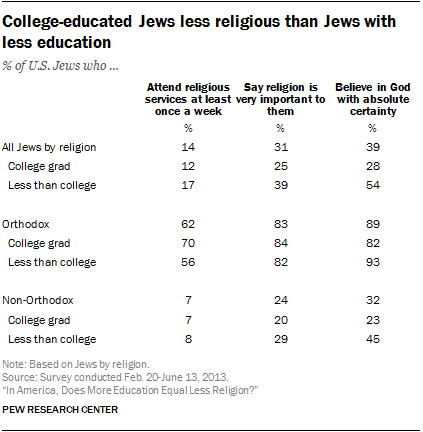 As with the religiously unaffiliated, highly educated Jews tend to be less religious than Jews with fewer years of schooling. For instance, Pew Research Center’s 2013 survey of U.S. Jews found that while more than half of Jews who have not completed college say they believe in God with absolute certainty (54%), only about three-in-ten Jewish college graduates say the same (28%). 5 And while about four-in-ten Jews who have not completed college say religion is very important in their lives (39%), only a quarter of Jewish college graduates say religion is very important to them (25%). 6
As with the religiously unaffiliated, highly educated Jews tend to be less religious than Jews with fewer years of schooling. For instance, Pew Research Center’s 2013 survey of U.S. Jews found that while more than half of Jews who have not completed college say they believe in God with absolute certainty (54%), only about three-in-ten Jewish college graduates say the same (28%). 5 And while about four-in-ten Jews who have not completed college say religion is very important in their lives (39%), only a quarter of Jewish college graduates say religion is very important to them (25%). 6
These differences are driven partly by Orthodox Jews, who tend to be much more religiously observant and less educated (in terms of number of years of secular schooling) than non-Orthodox Jews. However, even when the analysis is restricted to the non-Orthodox, Jews with college degrees are less likely to say religion is very important to them or that they believe in God with absolute certainty compared with Jews with lower levels of educational attainment.
Religion and education among Muslims
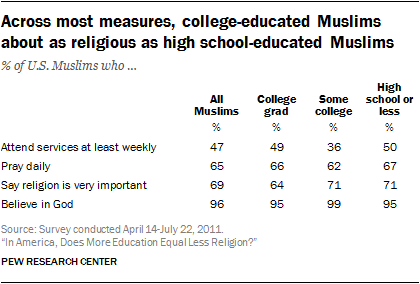 There is no clear pattern when it comes to the relationship between religion and education for U.S. Muslims. 7 According to a 2011 Pew Research Center survey of Muslim Americans, Muslims with a college education and those with no more than a high school education attend mosque and pray at about equal rates: Roughly half of Muslims in both of these educational groups attend services at least once a week, while two-thirds pray some or all of the five salah (Islamic prayers) each day. Nearly all Muslim Americans in each educational category (95% each) say they believe in God. 8
There is no clear pattern when it comes to the relationship between religion and education for U.S. Muslims. 7 According to a 2011 Pew Research Center survey of Muslim Americans, Muslims with a college education and those with no more than a high school education attend mosque and pray at about equal rates: Roughly half of Muslims in both of these educational groups attend services at least once a week, while two-thirds pray some or all of the five salah (Islamic prayers) each day. Nearly all Muslim Americans in each educational category (95% each) say they believe in God. 8
Although U.S. Hindus, Buddhists and other, smaller religious groups are studied in Pew Research Center surveys, including the 2014 Religious Landscape Study, they are not analyzed in this report, for a variety of methodological reasons. Interviews for the Landscape Study were conducted in English and Spanish, effectively excluding members of these religious traditions who speak only Asian languages. Pew Research Center’s 2012 survey of Asian Americans did include interviews in seven Asian languages, but the survey excluded respondents who did not identify as Asian American. Since a considerable share of U.S. Buddhists are not Asian Americans, the Asian Americans study is not able to provide information on the full population of U.S. Buddhists. Hindus are not included in this analysis of religion and education because the vast majority of Hindus in the U.S. have college degrees, and neither the Asian Americans study nor the Religious Landscape Study included enough interviews with Hindus who do not have college degrees to compare U.S. Hindus with different levels of education.


